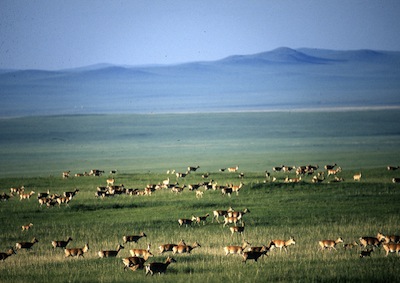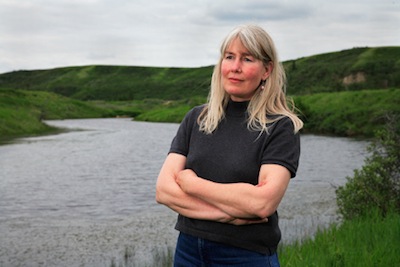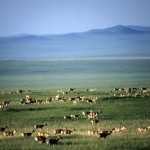On a Move: Central Asian Migratory Species
Large migratory mammals of Central Asia got a helping hand earlier this month, as the Parties to the Convention on Migratory Species, at their 11th meeting in Quito, Ecuador, agreed to adopt an initiative to protect wildlife in the region from increasing development threats, ScienceDaily reported Nov. 7.

Asia’s large migratory mammals, including Mongolian gazelles, will be protected under a new initiative by the Convention on Migratory Species. Photo by Kirk Olson/WCS
Linear infrastructure — roads, fences and other structures that support development — create barriers to 15 species considered by the initiative. The initiative’s first step is to create guidelines that offer development alternatives to governments and industry.
More than a million Mongolian gazelle are among the species that travel in massive numbers across this region of deserts, grasslands and mountains.
“A single Mongolian gazelle can use over 25,000 square kilometers,” said Peter Zahler, co-author of the guidelines and Asia Program Deputy Director for the Wildlife Conservation Society. “Keeping these enormous Central Asian landscapes intact and fully functional will be the key to protecting these globally significant wildlife species.”
Study Links Pesticide Use to Depression, Suicide
Farmers who use specific pesticides may be at greater risk of depression and suicide, according to a study featured in Scientific American on Oct. 6.
The research, which took place over 20 years, showed that fumigants and organochlorine insecticides were associated with increased depression risks of 80 percent and 90 percent, respectively. It also found that low-level exposure over time was an additional danger.
Epidemiologist Freya Kamel, one of the authors, explained the study’s results were corroborated by a variety of other data. “I don’t think there’s any question that pesticides can affect the functions of the brain.”
The research did not clarify exactly how the chemicals cause mental health problems.
Canadian Court Rules Landowner Can Sue Over Fracking Effects
Landowner and campaigner Jessica Ernst is free to sue the provincial government of Alberta, Canada, over the effects of fracking (hydraulic fracturing) on her property, the Huffington Post reported Wednesday.

Jessica Ernst on her land. Photo by Colin Smith.
The judge’s ruling follows a series of legal battles involving energy corporation Encana that Ernst began in 2007.
Ernst claims that since the fracking commenced, hazardous levels of chemicals have contaminated her well, to the extent that she can ignite the methane-laced water; she also asserts that her concerns had not been properly addressed.
“The message is to the Alberta government,” Ernst says. “Smarten up and clean up your act.”
The province unsuccessfully argued that it was immune from prosecution and did not have a private duty of care to individuals.
Editor: Amanda Painter. Additional Research, Writing and Editing: Planet Waves Monsanto Eco is produced by a team consisting of Amy Elliott, Carol van Strum, Len Wallick and Chad Woodward.


I very much appreciate these eco updates. Awareness is increasing, though slowly, & perhaps too slowly to result in action in time for many species to survive (possibly, say some, including us humans). I get so tired of hearing the words “THE environment” – the THE setting it all outside of us, when in fact we are PART of it, & utterly dependent upon the health of all other life. Thus I am delighted Eric, with your choice of theme for your 2015 annuals.
The Alberta anti-fracking case has not (to my knowledge) made the mainstream news here in Canada. It’s good news that Jessica Ernst can proceed with her action, but oh, so sad that the land, people, and animal life have had to suffer these consequences of greed. If the province didn’t have a private duty of care to individuals, what does it care for??? Thank-you for informing us.